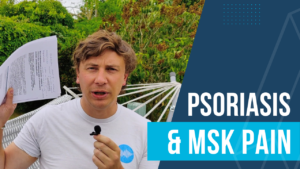Welcome back to the blog! Catchy title alert, clickbait? Maybe. This is a topic I have been wanting to talk about for a while and I have a really good little article in the blog to demonstrate why. I have put my thoughts in and I hope they get your brain ticking over. I have also put the audio on my podcast feed 🙂
Please consider heading to the shop to find more resources and supporting me to continue this hairbrained project! Or you can Buy A Coffee
You can also listen to all of my blogs as podcasts subscribe to your preferred channel HERE You can also find my podcast on Apple & Spotify & Google
As usual feedback is greatly appreciated and any further reading for me please send it my way!
PLEASE REMEMBER – THIS BLOG IS NOT A REPLACEMENT FOR CLINICAL REASONING, IF YOU ARE UNSURE GET ADVICE
Here are a few key points about Rheumatological conditions:
- They Masquerade as common musculoskeletal conditions like back pain and tendon pain
- Delays to diagnosis result in worse outcome measures across pretty much every category you think of
- It is 2021 and we are STILL struggling to get people with Rheumatological conditions in front of a Rheumatologist in a timely manner
The little article I mentioned is this one CLICK HERE written by Karl Gaffney, Dale Webb (from NASS) and Raj Sengupta. 3 people who know rather a lot about AxSpA and its challenges. To oversimplify a summary of their article, we arent getting better at getting AxSpA patients diagnosed than we were 10+ years ago and there are barriers at every stage of the persons journey. I can imagine COVID-19 has not helped in this regard and indeed we are seeing Rheumatology waiting lists of savage length.
Lets zoom in on the MSK Therapist role in all this, we cannot claim to be anywhere ahead of the curve as a cohort. We are responsible for seeing a great number of back pain and tendon pain patients often as the first point of contact. If not the first contact then likely the first MSK specialist contact. We need to ensure we are considering Rheumatological disorders as the cause of the attending persons symptoms. As far as Ican work out Therapists around the world ensure they consider Cauda Equina Syndrome as a possibility in all back pain or leg pain attendees (even if it is only for a brief second) and I think we should have the same vigilence for Rheumatological causes.
There is a flip side to this, we can’t just have a low threshold for referral to Rheumatologists. Depending upon where you sit in the patient pathway you will possibly need the assistance of others to get the referral or necessary investigations sorted, then obviously the Rheumatologist to see them. This is a use of resources and we need to be appropriately judicious with our use of these resources. Knowing who not to refer is equally as important as knowing who to refer, or what investigations or help would be useful to make a better informed decision. If we are obtaining investigations do we know how to interpret these with consideration to false positives, false negatives and the context of the referring symptoms. The number of times I have seen an Anti-CCP ordered for a patient with bilateral heel or back pain, or a lumbar spine xray for inflammatory sounding back pain. I have also seen many times a referral not made despite very convincing symptoms but negative inflammatory markers.
Now, please don’t think I am being critical of individuals here, I am trying to illustrate the challenges associated even when the condition is appropriately recognised.
So what I want you to think about is this. How interested are you in Rheumatology? Or maybe more accurately where does your interest end? What would happen if you referred a patient you thought had a rheumatology issue and it got rejected, waht would you do? Would you be able to recognise the correct investigations for there presentation and understand the interpretation? What would you do if you werent sure what someones diagnosis was? If the person came back after being diagnosed would you know how to help them?
I think if we consider not only our part within the pathway but also how we are utilising the pathway around us? This will be a good start for most of us as we try to improve the patient experience. The often quoteed delays to diagnosis of average 8+ years or in the article above the mean delay of 6.7 years is obviously highly problematic and we all need to care about our role in this.
Please do get back to me with your thoughts, how confident are you when faced with a potential Rheumatology condition, what barriers are you facing (be honest on the internal ones as well as external!)
Clearly feel free to check out any of the resources on my site to help you out as well!


